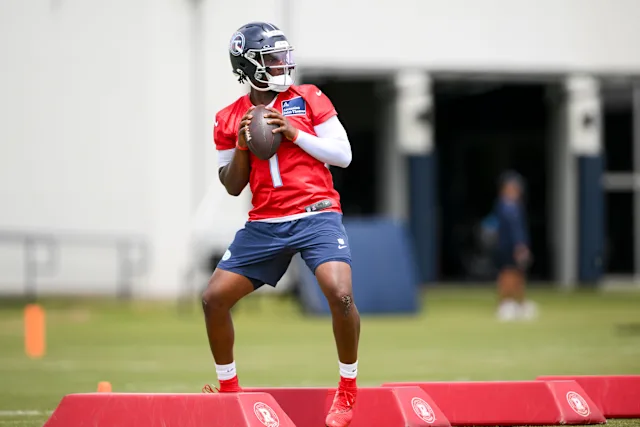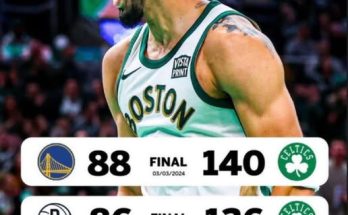The Tennessee Titans don’t need billboards, bold predictions, or booming speeches to generate motivation in 2025. They have something more potent: doubt. In a league obsessed with flash and firepower, the Titans have often been cast aside—dismissed as average, uninspiring, or simply forgotten. But if there’s one thing history teaches us, it’s that counting out Tennessee is a mistake.
The Titans enter the new NFL season surrounded by skepticism, yet well-equipped with fuel to turn that into a motivating force. That chip on their shoulder? It’s more like a boulder now. For years, this franchise has grappled with inconsistency and identity crises. They’ve tasted success—making deep playoff runs, challenging top-tier teams, and shocking doubters—but they’ve also endured growing pains and watched the league’s narrative push them to the margins. Now, with a roster full of underappreciated veterans, young players desperate to prove themselves, and a front office retooling with purpose, the Titans are primed to embrace the underdog role like never before.
It starts at the top. Mike Vrabel’s departure rocked the franchise. His no-nonsense, defensive-minded approach defined the Titans for years. But in his absence, a new chapter is being written. General manager Ran Carthon and new head coach Brian Callahan are shaping a team with quiet confidence and a commitment to evolving. It’s not just about building a competitive roster—it’s about shifting the culture and making sure Tennessee’s identity is no longer a punchline but a warning to every opponent: underestimate us at your own peril.
Will Levis, the second-year quarterback out of Kentucky, embodies the Titans’ chip-on-the-shoulder mentality. Passed on by multiple teams in the first round of the 2023 NFL Draft, Levis slid to Day 2 and came into the league with something to prove. While his rookie season featured both flashes of brilliance and growing pains, the Titans have made it clear he’s their guy going forward. And for Levis, this season is about turning those flashes into full-blown fireworks.
He’s not being handed anything—he’s earning it, and the pieces around him are being assembled with care. The Titans’ front office went to work in the offseason, bolstering a previously lackluster offense with a revamped receiving corps led by veteran DeAndre Hopkins and newly acquired wideout Calvin Ridley. Hopkins still has plenty left in the tank, while Ridley, fresh off his stint with the Jaguars, is eager to reestablish himself as a top-tier playmaker. This isn’t just a supporting cast—it’s a group of players with a chip on their own shoulders, eager to make noise and prove the Titans’ offense is no longer a liability.
The offensive line—long a sore spot—was addressed through the draft and free agency. Bringing in new talent and establishing a unit that can protect Levis and open lanes for Derrick Henry’s replacement, Tony Pollard, was a top priority. Yes, Henry is gone. And yes, that’s a massive void to fill. But the Titans didn’t panic—they pivoted. Pollard, coming off his own doubted status as a “complementary back” in Dallas, is now the man in Tennessee’s backfield. It’s his chance to prove that he’s not just a spark plug but a reliable workhorse. And with a coaching staff that knows how to play to its players’ strengths, Pollard could surprise a lot of people in 2025.
On defense, the Titans continue to embrace their bruising, blue-collar identity. Harold Landry III, Jeffery Simmons, and the recently acquired cornerback L’Jarius Sneed headline a unit that isn’t flashy but packs a punch. Sneed’s arrival from Kansas City brought a fresh layer of swagger to the secondary. He’s not just a great cover man—he’s a tone-setter, someone who knows what it takes to win and isn’t afraid to let his play do the talking. That kind of presence can anchor a defense and give younger players someone to rally around.
This defense is built to frustrate and suffocate. They may not have the household names like some of their AFC rivals, but they have cohesion and toughness—two traits often overlooked in offseason projections. In fact, it’s that very oversight that’s fueling them. The Titans are sick of being an afterthought, sick of watching division rivals get hyped while they’re treated like a rebuilding project. They hear the noise. And they’re channeling it.
The AFC South, long mocked as one of the NFL’s weakest divisions, has quietly become a battleground. With Trevor Lawrence in Jacksonville, C.J. Stroud in Houston, and Anthony Richardson back in Indy, the young quarterback revolution is underway. And while analysts trip over themselves praising the potential of the Jaguars and Texans, Tennessee is left out of the conversation. Fine. Let them talk.
The Titans don’t need to be the media darlings. They don’t need to win the offseason. What they need is to lean into the adversity, to carry the weight of that disrespect into every game, every rep, and every meeting. They need to remember what it felt like to be left out of the playoff picture, to be dismissed as yesterday’s news, to be written off before the season even begins. Because that’s how you build a chip on your shoulder big enough to change your season—and maybe your franchise’s future.
There’s something galvanizing about being doubted. It unites locker rooms, strengthens resolve, and creates urgency. This isn’t a Titans team trying to catch lightning in a bottle. This is a Titans team trying to build something sustainable, something that can challenge for years to come. And it starts with players embracing their roles and playing like they’ve got everything to prove—because many of them do.
Young wideouts like Treylon Burks are still out to show they’re worth the draft capital. Tight end Chig Okonkwo is on the brink of becoming a go-to weapon. The offensive line’s newcomers are eager to rewrite the narrative. And the defense’s core veterans, like Simmons and Landry, are still in their prime and hungry for more.
Even the coaching staff carries that chip. Brian Callahan isn’t a household name—yet. But as a first-time head coach coming from a background as an offensive coordinator, he knows he’ll be under the microscope. Every decision, every play call, every adjustment will be judged harshly. That’s part of the gig. But Callahan didn’t take this job to maintain the status quo—he took it to elevate it. To show he belongs in the upper echelon of NFL coaches. And he’s bringing that urgency into the building every day.
This isn’t a perfect roster. It’s not the most talented team on paper. But what it has is potential—and maybe more importantly, purpose. Everyone in the building has something to prove. Everyone’s carrying a little extra weight on their shoulders. And that kind of internal fire can’t be manufactured—it has to come from within.
For Tennessee, it’s no longer about chasing validation from the outside world. It’s about rewriting their own story, on their own terms. It’s about transforming from the overlooked to the overachievers, from a team with potential to a team that delivers.
There’s an undeniable hunger brewing in Nashville. And while the Titans might not be the sexiest pick to win the division, don’t be surprised if they’re still standing when the dust settles. Because when a team builds a chip on its shoulder the right way—through work ethic, resilience, and unity—it doesn’t just make them dangerous. It makes them unstoppable.
In a league where perception often outweighs performance, the Titans are poised to flip the script. No more waiting for recognition. No more hoping for praise. Just a team, ready to fight, fueled by the disrespect, and determined to prove that the fire inside them burns hotter than the spotlight they were denied.
So let the doubters talk. Let the projections ignore them. The Titans are listening—and they’re using every slight as kindling. Because in 2025, they’re not just playing for wins. They’re playing for respect. And they’re ready to take it.



